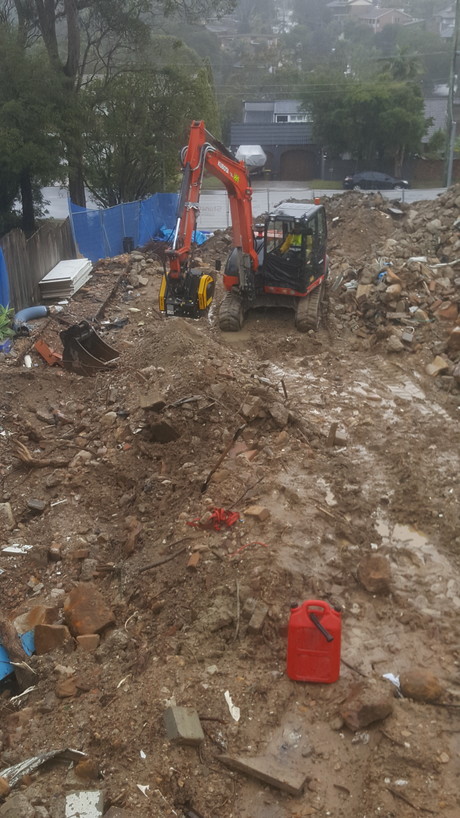Constructions costs cut with on-site recycling

The latest in mobile crushing technology has been deployed on a steep and challenging residential building site in the southern Sydney suburb of Sylvania, where it has been used to crush demolition spoil for recycling via an innovative new process.
An MB C50 crusher bucket, fitted to an 8-tonne Kubota hydraulic excavator, was utilised on the Sylvania site, which presented challenges in terms of gradient and need for stabilisation. The crusher processed tiles, bricks, mortar and foundation concrete that was recycled in situ, resulting in large and stable foundations on which two new homes are being built.
Thanks to Soilstone technology, unwanted or excess soil material, demolished concrete and brick material can be engineered to form a mass-engineered soil structure for use and function on construction sites. The technology uses mechanical and natural chemical processes to treat native spoil to produce the properties of rock that can be formed into a structure.
Instead of building foundations from purchased concrete, the natural site material is crushed together with additive chemicals that recycle the spoil into a durable and progressively hardening rock-like mass. The process has been tested, evaluated and approved by the NSW building regulator.
The engineered in situ soil and processed waste aggregates mix provides a simple alternative in ground improvement that minimises the use of material grading and compaction requirements, yet attains the properties of varied shear, compressive and bonded strength of stone. The process has been used successfully for mitigation of soil erosion, improved bearing capacity or subgrade reaction, improved resistance to water permeability and improved resistance to ground movement and vibration forces.
A major benefit of the site drainage design is the ability to form multiple drainage lines while retaining structural mass and stability. The environmentally sustainable material is moisture-impervious, meaning it can be used to form drainage and other structures in a way that would be difficult or more expensive than if using poured concrete. The material is also not prone to corrosion like steel.
The process is suitable for applications such as slope embankment stabilisation, buttressing to halt and remediate coastal erosion, complex construction, flood mitigation and management, and the prevention and repair of flood damage to buildings. It can also be used as an alternative material in waffle pods; foundation works retrofitting and stabilisation; road base materials; mine site erosion control; landfill contamination control; and other in situ ground improvement works.

MB crusher and screening buckets allow operators and contractors to reprocess materials in situ, helping reduce the load on the environment by making useful by-products of otherwise low-value raw feed. In urban areas the carting and dumping costs alone often mean a fast ROI, and in rural areas it can mean producing useful and valuable materials in places where buying materials is often prohibitively expensive.
In the case of the Sylvania site, the Soilstone process not only provided a suitable engineering solution, it also saved the customer in excess of $36,000, which would have been required for material removal and disposal costs.
“Typically, you save around 50% of the material that has to be removed off site,” said Soilstone’s developer, consulting and research engineer Edgar Agda. “This means all construction materials can be minimised. The reconstituted material is extremely stable yet can be drilled easily or have sections cut out to add or retrofit service lines.
“In addition, there is virtually no limit to the type of material that can be used for the process. Sand, gravel, clay rock recycled bricks, tiles, tyre waste and processed plastic can be used.”
QED Huberg SEM5000 portable methane detector
The Huberg SEM5000 is a field-proven portable methane detector for landfill surface...
REDWAVE TEX textile sorting solution
The REDWAVE TEX is a flexible sorting solution designed specifically for the textile industry.
PCO.Tech pco.pixelfly 1.3 SWIR camera
The pco.pixelfly 1.3 SWIR is a machine vision camera with an InGaAs image sensor that is...








